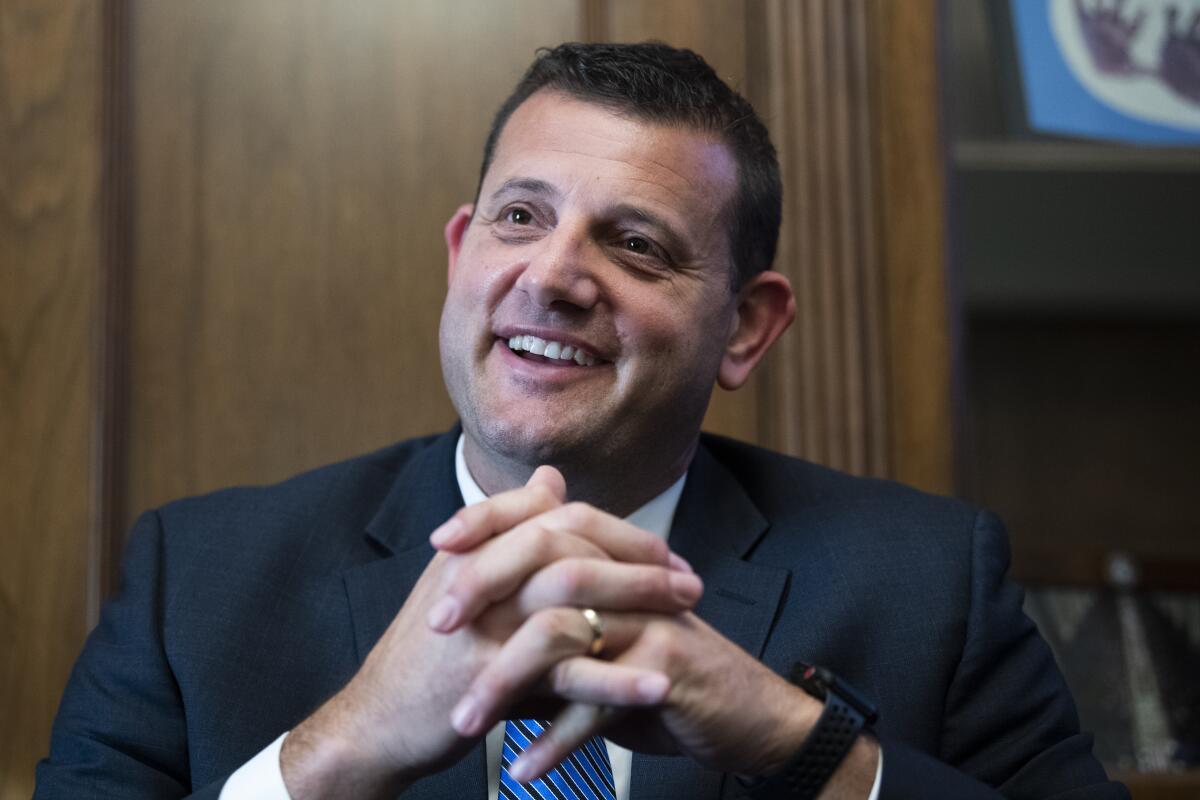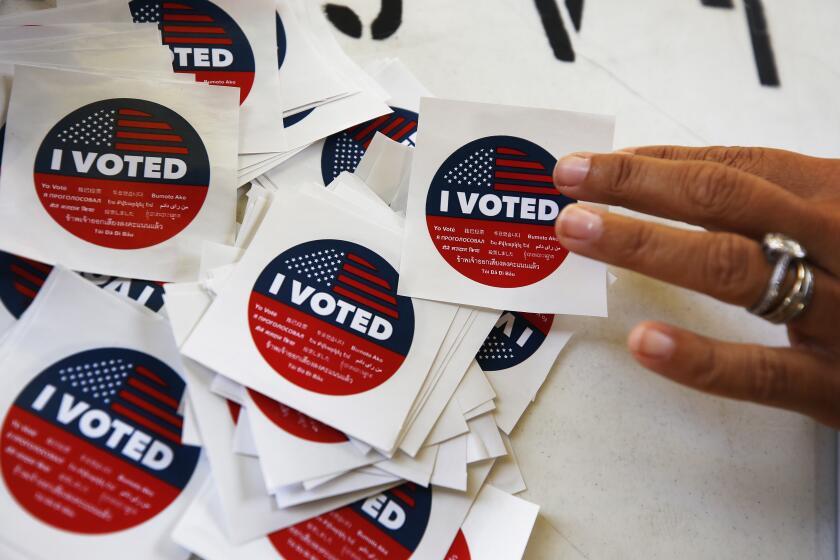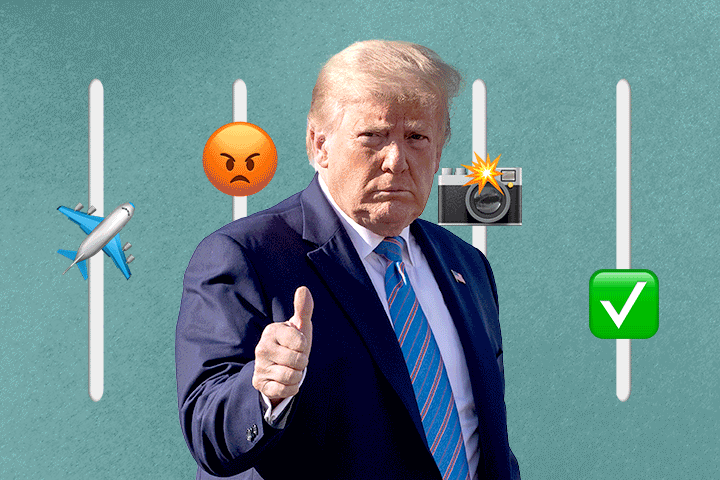California Rep. David Valadao voted to impeach. Can he keep his seat if Trump stays quiet?

- Share via
HANFORD, Calif. — The moment Rep. David Valadao and nine other House Republicans voted to impeach then-President Trump for inciting an insurrection at the Capitol, they were all engulfed in a wave of backlash — outraged conservatives back home, challengers eager to oust them, and Trump’s constant commentary casting doubt on their political futures.
These days, Valadao is distinctly not like the others, for one key reason: Trump has not said a word publicly against him or his reelection bid.
Valadao’s district is widely considered to be one of the country’s most competitive in the battle for control of the House this November. For Republicans, especially House GOP leader Kevin McCarthy of Bakersfield, holding the seat is central to the goal of capturing a decisive majority. Democrats, eyeing their significant registration advantage in the district, see one of the few real chances to oust a GOP incumbent.
But first, Valadao must get through his June 7 primary. Anger still simmers in some right-leaning corners of his tightknit Central Valley community — discontent that Valadao’s two GOP challengers hope to tap into.
“There’s a pretty big group that was very, very put off by the impeachment vote, who may not vote for him specifically because of that one vote,” said Dennis Townsend, whose district as a Tulare County supervisor overlaps with the congressman’s.
But another Republican contingent believes Valadao did the right thing. And yet another faction of voters, Townsend said, is “taking a much more pragmatic look” — including himself in that camp.
“Even though they didn’t appreciate that vote for impeachment,” he said, “they’ve seen the good work he’s done for the district otherwise.”
The impending primary has split this district, but there’s not the deeply felt acrimony of the battle awaiting Wyoming Republican Rep. Liz Cheney, who also supported impeachment. And the atmosphere is not so toxic as it is in Ohio, where GOP Rep. Anthony Gonzalez, another pro-impeachment vote, decided he’d rather retire than run against a Trump-backed opponent.
A combination of personal relationships, political realism and powerful allies has insulated Valadao from the worst of the impeachment vote fallout.
“Valadao is such a nice guy,” said Jon Fleischman, a Republican strategist in California. “He’s holding on to a seat that can’t be won by any other Republican. And everyone sees him under McCarthy’s wing.”
California’s 2022 primary election ballot includes races for governor, attorney general, the Legislature and Congress, as well as local contests.
Back in Hanford, as primary ballots were just about to hit mailboxes, Valadao was spending his evening talking to teenagers likely too young to vote. The high school cafeteria became an ad hoc college fair — tables cleared out, information booths manned by uniformed service members — as about 50 students and parents gathered information about West Point, the United States Naval Academy and other military schools.
A head taller than nearly everyone in the room, Valadao has a physical presence that is completely at odds with his unassuming demeanor. The 45-year-old dairy farmer spoke in a soft near-monotone, speeding through prepared remarks as though he couldn’t wait to cede the stage. Still, his voice took on new energy when he discussed his role as a congressman in nominating local students to the service academies.
“This is honestly one of my favorite duties,” he told his audience. “I love this part of my job.”
He was less effusive when the focus turned back to politics. As the event wound down, students still milling about, Valadao sat for questions about how his impeachment vote could affect the upcoming election.
“I’d say the average voter — they’re just not paying attention to that anymore,” he said. “They’re sick of talking about it.”
They are more interested in inflation, he said. Crime. Homelessness. And, of course, water, a perpetual issue in the agricultural heart of drought-plagued California.
The conversation about the political backlash was interrupted every so often so he could pose for photos with students and their parents.
There remains a vocal contingent in this area who say Valadao permanently lost their trust when, as he put it, he followed his gut on the impeachment vote.
“What David Valadao did was a flat-out betrayal of his constituency,” said Lance Jackson, 55, a tree-fruit grower from Kingsburg, arguing that the congressman’s only job was to reflect the will of his voters.
Jackson, who was a constituent of Valadao’s before the recent redistricting, is among the fierce critics who live in deep-red pockets that border Valadao’s district. Before the sting of the impeachment vote, many had volunteered for Valadao’s hard-fought campaigns.
“We walked for him. We were at his celebration the night of [the election] on his property in Hanford,” said Cindy Regier, a 59-year-old Dinuba resident who runs a wedding venue. “I mean, we were committed.”
In Valadao’s hometown of Hanford, Larry Faria, a public safety worker, and John Darpli, an alfalfa broker, channeled their frustration over the impeachment vote into forming a grassroots group focused on local politics. The letdown they felt over Valadao — who they’ve long just called David — convinced them they had to hold politicians accountable.
“He’s actually one of our brothers in our community,” said Darpli, 49. “But we felt that as a conservative community, he didn’t represent us very well.”
Former President Trump uses primary endorsements to seek revenge, push election fraud lies and shape the Republican Party. How are his candidates faring?
The personal and the political intersect all over this small Central Valley community — including on the primary ballot, where Adam Medeiros, a Hanford salon owner, is one of the Republicans challenging Valadao. Medeiros, 61, cut the congressman’s hair for years.
He said Valadao’s vote compelled him to run, but his campaign has focused more broadly on conservative issues such as clamping down on illegal immigration, rather than tearing into his former client.
“People always want me to talk crap on David,” Medeiros said. “I don’t like what he did, but I know his family.... They’re wonderful people.”
The other GOP contender is Chris Mathys, 64, a former Fresno city councilman now living on a ranch west of Firebaugh. He has made his opposition to Valadao more central to his campaign, vowing on his website to do “everything in [his] power” to oust the incumbent.
Both Medeiros and Mathys would seem suitable for an endorsement from Trump, who has backed challengers to pro-impeachment lawmakers on the ballot this year — five other House Republicans and one GOP senator. Instead, the former president has been silent, much to the exasperation of his ardent supporters.
“I’ve wondered that!” said Keith Korsgaden, discussing Trump’s reticence in the dining room at Crawdaddy’s, his Visalia restaurant, where Medeiros held a campaign event. In a tone of urgent bewilderment, he mused aloud, “How do I get ahold of him? I’ve said this myself — why will Trump not endorse somebody [against] Valadao?”
Medeiros said he had tried “every other angle” to get Trump’s attention, but “it’s crickets over there.” Mathys, slightly more hopeful, insisted: “There’s still time. It’s still a possibility.”
A spokesperson for Trump did not respond to a request for comment.
In this primary season, Trump endorsements have often — though not always — caused GOP voters to coalesce around the former president’s pick. At a minimum, his support has helped raise money; every Trump-backed challenger to a Republican impeachment supporter has raised more than Medeiros ($100,000 brought in as of March) and Mathys ($350,000 in receipts, nearly all loaned by the candidate). Valadao has raised nearly $2 million.
Still, absent a signal from Trump, activists fear the anti-Valadao vote may fracture, helping the congressman and Assemblyman Rudy Salas, the sole Democrat on the ballot, advance in California’s top-two primary.
Nearly one-third of state’s districts in Congress would have Latino majorities under independent commission’s plan. The new map also endangers some GOP incumbents.
Meanwhile, Valadao enjoys the advantages of incumbency. He has maintained the support of major players in agriculture, the dominant industry in his district, and has locked down endorsements from the state and local GOP committees and many Central Valley Republicans.
Valadao’s most crucial supporter may be McCarthy, who represents a neighboring district.
The aspiring House speaker and engineer of Republicans’ strategy to retake the chamber briefly denounced Trump over the Jan. 6 attack, but has backtracked and remained close to the former president. McCarthy has given Valadao nearly $185,000 through a joint fundraising committee and endorsed the congressman on local news.
“This is a race Kevin is paying attention to and ensuring that things are going relatively smoothly,” said Mike Abboud, a spokesman for McCarthy’s political operation.
Valadao did not speculate about why Trump had stayed out of the race. Instead, he laid out the reality anyone observing the race would know: winning Democratic support is a necessity if the GOP is to hold the seat in November.
“My primary opponents don’t have the resources, don’t have the knowledge or understanding of how to run the type of race that needs to be run to win this seat,” he said.
Even for Valadao, the path to victory is daunting. He lost the seat in 2018 to T.J. Cox, a Democrat, and barely eked out a victory in a rematch two years later. The math has only gotten tougher after redistricting: Voters within the newly drawn district boundaries picked Joe Biden over Trump by 13 percentage points.
Valadao’s success so far has been one of delicate navigation. He’s a reliable Republican who tacked to the middle on immigration, a marquee issue in this majority-Latino, heavily agricultural region. His impeachment vote may be another selling point to Democratic voters. Some, like Carol Hernandez, a life insurance agent and civic leader in Hanford’s Latino community, said she admired Valadao for doing “the right thing at the right time.”
Still, she planned to back Salas.
Party loyalty may cost Valadao some crossover votes. But he may benefit from such partisan reflexes among his conservative critics. Faria, 45, the Hanford activist, said that if it comes down to Valadao versus Salas in November, he’ll stick with the GOP candidate, mindful how the party will need that seat.
“I’d say that’s the consensus for local conservatives,” Faria said. “If that’s the hand we’re dealt, that’s the hand we’re dealt.”
More to Read
Get the L.A. Times Politics newsletter
Deeply reported insights into legislation, politics and policy from Sacramento, Washington and beyond. In your inbox three times per week.
You may occasionally receive promotional content from the Los Angeles Times.














